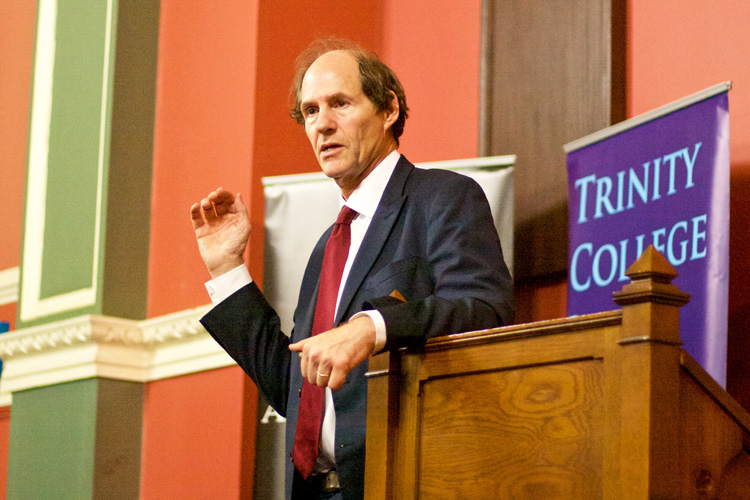
If one good idea can change the world, Cass Sunstein has given it a good try over the last few decades. Even his least famous ideas have had vast impacts on government, business and law, while his best have helped change the lives of millions. Tonight, he spoke to the Trinity College Law Review.
While behavioural economics on a wet Friday evening in the Graduates Memorial Building (GMB) sounds more like a dreaded lecture than a hot-ticket event, Sunstein certainly offered the audience something of an insight into the thinking of a man who counts former President of the US, Barack Obama, as a disciple.
Sunstein is most famous for Nudge, one of those books that broke out of the stranglehold of academia, causing ripples among policy-makers and the public all the way from Washington to London. Co-written with behavioural economist Richard Thaler, it argued human irrationality is predictable and – crucially – social environments can be changed to nudge people toward behaviour that’s more rational.
If this sounds dull or inconsequential, it’s not. Thaler won the Nobel Prize in Economics in October for the very work Sunstein helped pioneer and popularise. It’s heartening, then, that a large crowd turned out in Trinity tonight. Indeed, if one was to list those who had filled venues in Trinity over the last few months, it would include Kristin Chenoweth, Michael O’Leary – and Sunstein. Sunstein is arguably the most impressive, but much more quietly so. He has been described as “the quintessential University of Chicago habit of mind” – rational, logical, evidence-based. Yet if this suggests someone cold or uncaring, this couldn’t be further from the truth.
Drawing on a range of examples, from rankings of human attractiveness to climate change, Sunstein softly drew out the theories he has pioneered over a lifetime in academia and policy.
And if his talk started at a micro-level – “human beings, on average, are unrealistically optimistic” – it soon discussed why his behavioural theories matter: “If people have good news or bad news about climate change, will they update asymmetrically?” If this sounds confusing, it simply means humans often reinforce their own biases. Offering the example of gun laws, Sunstein pointed to the idea that, following gun crimes, pro-gun advocates often take the fact that a gun-owner was able to help stop a dangerous shooter as evidence that the current law is working.
For all intents and purposes, Sunstein took over hosting duties from the School of Law’s Dr David Kenny not long into the talk, pacing slowly across the stage, fielding questions and joking with the audience. Lectures on Samuel Beckett and behavioural economics melded together with anecdotes about George Lucas and the Return of the Jedi. If much of the talk was high brow, the audience seemed to keep up, with people nodding vigorously at Sunstein’s points and laughing along to quips about policy failures.
He drew laughs for mocking his own poorly named “yeah, whatever” idea, which explains why we too often accept the status quo. If you’ve never changed the default settings on your phone, or never looked at renegotiating a contract once it’s been presented to you, you know what the “yeah, whatever” concept is.
Sunstein didn’t dumb anything down. He spoke like a legal academic, discussing the building blocks of a complex theory that can have dramatic real-world impacts. At one point, an audience member apologised for asking Sunstein to solve all the world’s problems. But one gets the sense Sunstein wouldn’t mind doing so in the same methodical, coherent way he approached tonight’s talk.
If Sunstein’s talk was political without being partisan, the audience questions quickly tried to test his knowledge of the latest policy puzzles facing the US. Indeed, it was no coincidence that two of the first three questions were from Americans. And if Trump – too often to the fore of discussions in the GMB these days – wasn’t mentioned by name, Sunstein’s fervent commitment to rational decision-making was a rebuke in itself.






